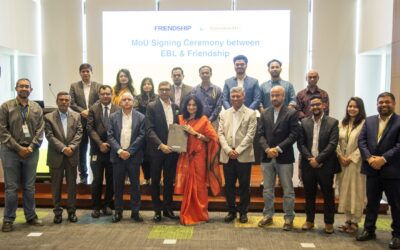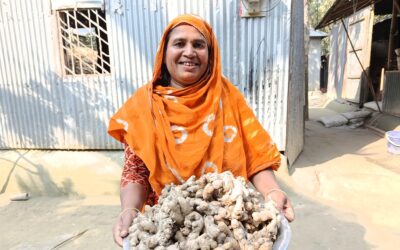Workshop on one health conducted in Dhaka with findings and recommendations to be presented in Lyon in July
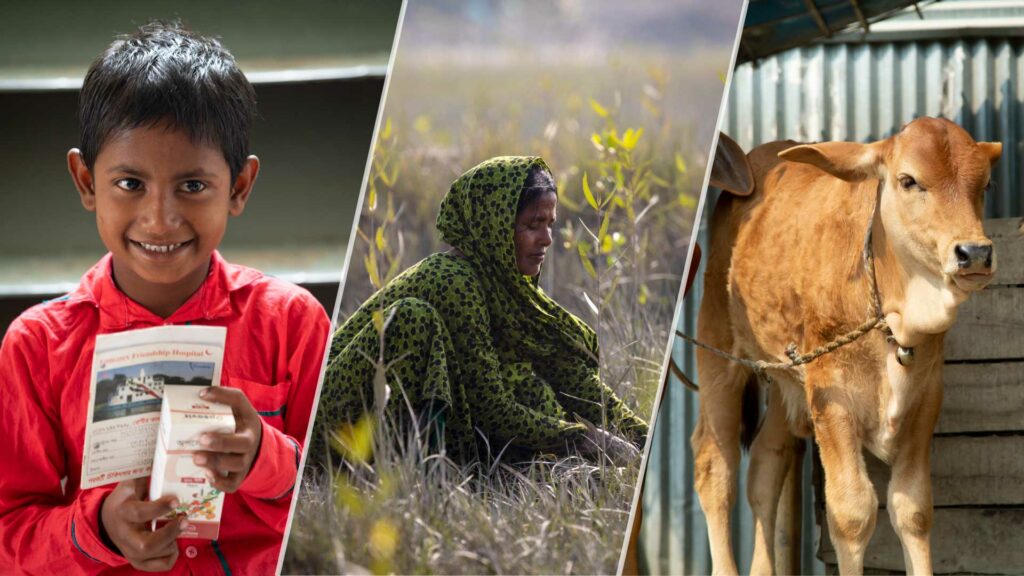
by Raeed Abd-Allah Chowdhury
June 14, 2023
Healthcare, or at least human healthcare is an uphill battle, unless we do something about what is causing health concerns in the first place. That is, to perhaps oversimplify it, the concept behind “one health”—that human, animal and environmental health all have to work in conjunction to achieve a sustainable, permanent goal. That was the discussion at a workshop in Dhaka, on June 6, 2023 hosted by Friendship.
One Health Bangladesh and the associated secretariat started in 2008 as part of the Institute of Epidemiology, Disease Control and Research (IEDCR) of the Government of Bangladesh, with representatives from 12 national and international agencies and organisations. The national coordination committee formed under it conducts monthly meetings and the annual “International One Health Conference” in Bangladesh. Secondly, One Sustainable Health for All was established in 2020, to foster dialogue between global health professionals, researchers, and actors in the field to further the Sustainable Development Goals (SDG 2030). Finally, One Sustainable Health Forum was launched in 2021 in Lyon, France bringing together more than 50 European and global professionals and civil society organisations, working on a holistic approach to health, with attention to the nuances of human, animal and environmental health. It constitutes a cross-disciplinary network of experts collaborating through six working groups integrating the concept of one sustainable health/planetary health into a single, operational approach.
On a sweltering summer afternoon, with temperatures reaching record levels amidst a heatwave and frequent electricity outages, there could be no more apt a time to host the workshop. Outside Crowne Plaza’s ballroom in an upscale downtown area of Dhaka City, the streets are like a sauna with thermometer readings hovering around 40 degrees Celsius, and no respite to be found in air-conditioning. Climate change was making itself very obvious, with a severe tropical cyclone sandwiched between heat waves in the country.
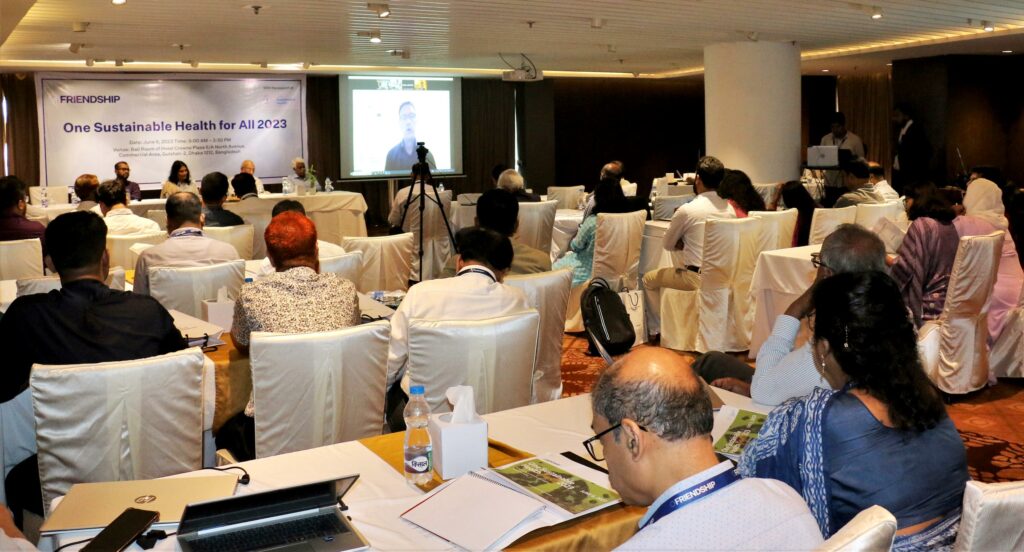
The guests of honour at the workshop were, Dr. Shah Munir Hossain, former director general of DGHS; Dr. Mahmudul Hasan Sikder, national technical advisor, One Health, FAO, ECTAD Bangladesh; Dr. Rafiqul Islam, senior national technical advisor, FAO; and Runa Khan, founder, Friendship along with William Lebedel, chair, Friendship France.
Runa is also the honourary president of the One Sustainable Health Forum Approach, and Friendship is playing a vital role in ensuring that the activities and voice of Bangladesh are heard at the forum in France. The points discussed at the workshop will be collated, and then presented as a workshop declaration consisting of Bangladesh-specific and global recommendations in Lyon on July 6, exactly a month after the workshop.
Following addresses by the guests of honour elaborating on the concept and importance of “one health”, the attendees split into three tables, each with a chairperson, a facilitator, a rapporteur and a specific subject for discussion. These were “mitigating the impact of environmental pollution and climate change to have a better impact on health”; “sustainable food systems for improved nutrition and health for both humans and animals” and “equitable access to quality health-related services for humans and animals”. Each table discussed the current scenario relevant to the specific topic, the role of the government and stakeholders, existing challenges, how it can be liked with one health and the subsequent recommendations and strategies to move forward under the one health approach in Bangladesh. These were presented by the chairperson with assistance from the rapporteur following the discussion session, and the combined recommendations will be presented next month.
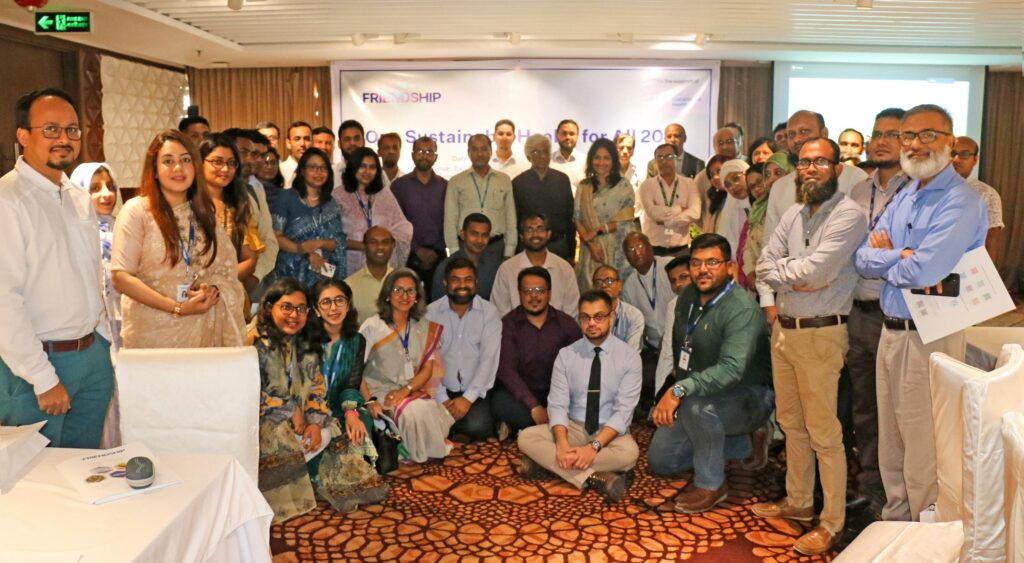
These recommendations were collected from each table, trimmed, combined, and then sorted into plans and policies, coordination, and capacity development. In gist, the chairpersons present came to the conclusion that a short, mid and long-term strategic plan is necessary across all relevant stakeholders to streamline the collaborative activities, in coordination with the One Health Secretariat in Bangladesh. These actions should aim to address the importance of one health, ease facilitation of all activities, sensitise all participants to the importance of one health, review existing policies, conduct thorough research for disaggregated demographics, conduct advocacy, foster a conducive environment for one health and come up with finalised, holistic policies.
The panelists further asserted the coordination between inter-ministerial bodies, civil societies, directorates, I/NGOs, and other relevant agencies, while ensuring the participation of both the private and public sectors across national and sub-national levels. It was also surmised necessary to include a robust surveillance system and integrated MIS with a special focus on Antimicrobial Resistance (AMR), zoonotic diseases, environmental and environmental health aspects to assess routine information, outbreaks and monitoring conditions within a comprehensive One Health Framework.
Finally, there needs to be a strengthening of the institutional capacity of relevant government, non-governmental, academic and corporate bodies to adopt one health at various levels, also in coordination with the Secretariat. That includes capacity and awareness building along with sensitisation for technical, non-technical, social and business communities, and promotion of the one health approach among them. Also recommended was including one health in the curricula for public health programmes and similar academia.
These recommendations, as discussed and compiled by subject matter experts at the workshop, will set a precedent for all future actions, and comprise the declaration in Lyon, France on July 6.

